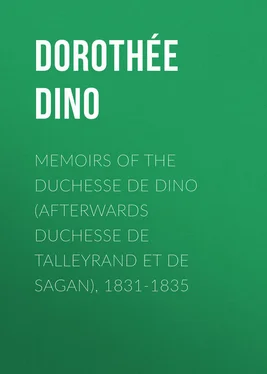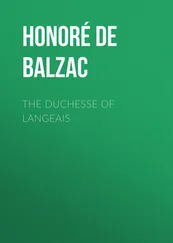Dino Dorothée - Memoirs of the Duchesse de Dino (Afterwards Duchesse de Talleyrand et de Sagan), 1831-1835
Здесь есть возможность читать онлайн «Dino Dorothée - Memoirs of the Duchesse de Dino (Afterwards Duchesse de Talleyrand et de Sagan), 1831-1835» — ознакомительный отрывок электронной книги совершенно бесплатно, а после прочтения отрывка купить полную версию. В некоторых случаях можно слушать аудио, скачать через торрент в формате fb2 и присутствует краткое содержание. Жанр: foreign_antique, foreign_prose, на английском языке. Описание произведения, (предисловие) а так же отзывы посетителей доступны на портале библиотеки ЛибКат.
- Название:Memoirs of the Duchesse de Dino (Afterwards Duchesse de Talleyrand et de Sagan), 1831-1835
- Автор:
- Жанр:
- Год:неизвестен
- ISBN:нет данных
- Рейтинг книги:4 / 5. Голосов: 1
-
Избранное:Добавить в избранное
- Отзывы:
-
Ваша оценка:
- 80
- 1
- 2
- 3
- 4
- 5
Memoirs of the Duchesse de Dino (Afterwards Duchesse de Talleyrand et de Sagan), 1831-1835: краткое содержание, описание и аннотация
Предлагаем к чтению аннотацию, описание, краткое содержание или предисловие (зависит от того, что написал сам автор книги «Memoirs of the Duchesse de Dino (Afterwards Duchesse de Talleyrand et de Sagan), 1831-1835»). Если вы не нашли необходимую информацию о книге — напишите в комментариях, мы постараемся отыскать её.
Memoirs of the Duchesse de Dino (Afterwards Duchesse de Talleyrand et de Sagan), 1831-1835 — читать онлайн ознакомительный отрывок
Ниже представлен текст книги, разбитый по страницам. Система сохранения места последней прочитанной страницы, позволяет с удобством читать онлайн бесплатно книгу «Memoirs of the Duchesse de Dino (Afterwards Duchesse de Talleyrand et de Sagan), 1831-1835», без необходимости каждый раз заново искать на чём Вы остановились. Поставьте закладку, и сможете в любой момент перейти на страницу, на которой закончили чтение.
Интервал:
Закладка:
There was a reasonableness and a delicacy in the letters both of the Empress and M. de Nesselrode which accords with all I hear of the Czar Nicolas and which augurs well for the result of this second education of the heir to the throne of ice. I was particularly glad to see that the frankness with which Madame de Lieven had expressed her regret at leaving England had been well received. She said to me à propos of this, "It proves to me that one can be sincere in our country without breaking one's neck." I hope that she may find more and more reason to think so, but it will be necessary to keep this sincerity in cotton wool for some time to come.
She spoke to me with great admiration of the Emperor as a man with great gifts who is destined to become the greatest figure in contemporary history. On this I repeated to her a remark made by M. de Talleyrand with which she was much pleased. This is what he said: "The only Cabinet which has not made a single mistake during the last four years is the Russian Cabinet, and do you know why that is so? The Russian Cabinet is never in a hurry."
The Queen of England has shewn Madame de Lieven on the occasion of her recall much of the kindness which is natural to her, though it must be difficult for her Majesty to forget how little respect the Princess showed her during the life of George IV. and that of the Duke of York, and above all how discourteous the patronesses of Almack's with Madame de Lieven at their head were to her on the only occasion she was there when she was still Duchess of Clarence. I have even on one occasion heard the Queen remind Madame de Lieven of this incident in such a way as greatly to embarrass her. However all these old quarrels are forgotten, and when the leave-taking came the Queen's conduct was perfect. As to the King it is different; he has never even said either to M. or Madame de Lieven that he was aware that they had been recalled. They blame Lord Palmerston and I don't think they are far wrong.
London, June 9, 1834. – Yesterday I found the Duchess-Countess of Sutherland very busy getting together twenty ladies to join in offering Madame de Lieven some tangible token of the regret felt at her departure by the ladies of her particular acquaintance. This idea is particularly English, for the spirit of association is everywhere in this country and enters even into matters of compliment and civility. I thought that the Princess could not but be pleased and flattered, and I was delighted to add my name to the list. Ten guineas is the subscription and I believe the testimonial will take the shape of a fine bracelet inside which our names will, if possible, be inscribed.
M. de Montrond has returned from Paris. His wit is as ready and as cutting as ever, and, though he is certainly anything but a bore, I again feel with him the uneasiness which one has in the presence of a venomous creature with a poisonous sting. The charm which used for a long time to fascinate M. de Talleyrand is gone and has left behind a sense of fatigue and oppression which is the more felt as their long standing friendship and the remembrance of their past intimacy hardly permit them to make an end of it.
I don't think there is anything new in what M. de Montrond tells me of Paris. He speaks of the King's ability; no one contests it. It is equally well known that the King is always talking, and always of himself. M. de Montrond complains of the complete destruction of Parisian Society, of the spirit of division which is breaking up everything and which does not decrease. He gives amusing accounts of the embarrassments of the Thiers family, of the high diplomatic ambitions of Marshal Soult for his son, of the alarm of Rigny and others at the kind of effect produced here by M. Dupin. They think that it is ominous of a future premiership and are almost angry with M. de Talleyrand for showing him attention. They do not see that M. Dupin's reception here is only a compliment to us, he being a man who is less fitted than any one in the world to shine in good English society, and that our object is merely to turn the turgid stream of M. Dupin's eloquence in favour of the English alliance of which he is a bitter opponent.
I found Lord Grey yesterday in a state of depression which he did not attempt to disguise. It is a contagious malady, and seems to have attacked all his adherents. Lord Grey's lassitude and weariness is to my thinking the most alarming symptom of the weakness of the Cabinet as now constituted. Lord Durham's attacks on Lord Grey in the Times wound him deeply. Conservatives and Radicals are alike speculating on the succession of the Whigs, and it is impossible to disguise the fact that this is a critical moment for every one.
While talking yesterday to a friend I remembered that when I was seventeen, I, like many other women of the period in Paris, was romantic or silly enough to consult Mlle. Lenormand who was then much in vogue, taking what I thought sufficient precautions not to be recognised by her. One had to fix the day and the hour beforehand and this I arranged through my maid giving a false name and address. She gave me an appointment and on the day named I went with my maid in a cab, taken at a distance from my abode, to the Rue de Tournon where the sorceress lived. The house was of good appearance and the rooms clean and even rather pretty. We had to wait till a gentleman with moustaches had left the chamber where the Sibyl delivered her oracles. I made my maid go in first and my turn came next. After some questions about the month, day and hour of my birth, and about my favourite animal, flower and colour, and about the animals, flowers and colours which I particularly disliked, she asked whether she should make the great or the little cabala for me, the price being different. At last she came to my fortune and told me what follows. I may have forgotten some insignificant details but I give the main part of what she predicted, and I have since repeated it to several persons, my mother and M. de Talleyrand among the number.
She said that I was married, that I had a spiritual bond with an exalted personage (my explanation of this is that the Emperor was my eldest son's godfather), that after much pain and trouble I should be separated from my husband, that my troubles would not cease till nine years after this separation, and that during these nine years I should experience all manner of trials and calamities. She also said that I should become a widow when no longer young but not too old to marry again which I should do. She saw me for many years closely allied with a person whose position and influence would impose on me a kind of political position and would make me powerful enough to save some one from imprisonment and death. She said also that I should live through very difficult and stormy times, during which I should have very exciting experiences, and that one day even I should be awakened at five o'clock in the morning by men armed with pikes and axes who would surround my house and try to kill me. This danger would be the consequence of my opinions and the part I was destined to take in politics and I should escape in disguise. I should still be alive, she said, at sixty-three. When I asked whether that was the destined end of my days she answered, "I don't say you will die at sixty-three, I only mean that I see you still alive at that age. I know nothing of you or your destiny after that."
The leading circumstances of this prediction seemed to me then too much out of the probable course of events to cause me any anxiety. I told my friends about it as a sort of joke, and, though the most improbable parts of it have come true, such as my separation from my husband, my prolonged troubles, the interest in public affairs which M. de Talleyrand's concern with them has imposed on me, I confess that unless some one has mentioned some similar matter, I think very rarely about what Mlle. Lenormand told me, and very little of herself though she was a remarkable person. She seemed to be over fifty when I saw her. She was rather tall and wore a loose, black, trailing gown. Her complexion was ugly and confused, her eyes were small, bright and wild; her countenance, coarse and yet uncanny, was crowned with a mass of untidy grey hair. The whole effect was unpleasant, and I was glad when the interview was over.
Читать дальшеИнтервал:
Закладка:
Похожие книги на «Memoirs of the Duchesse de Dino (Afterwards Duchesse de Talleyrand et de Sagan), 1831-1835»
Представляем Вашему вниманию похожие книги на «Memoirs of the Duchesse de Dino (Afterwards Duchesse de Talleyrand et de Sagan), 1831-1835» списком для выбора. Мы отобрали схожую по названию и смыслу литературу в надежде предоставить читателям больше вариантов отыскать новые, интересные, ещё непрочитанные произведения.
Обсуждение, отзывы о книге «Memoirs of the Duchesse de Dino (Afterwards Duchesse de Talleyrand et de Sagan), 1831-1835» и просто собственные мнения читателей. Оставьте ваши комментарии, напишите, что Вы думаете о произведении, его смысле или главных героях. Укажите что конкретно понравилось, а что нет, и почему Вы так считаете.












